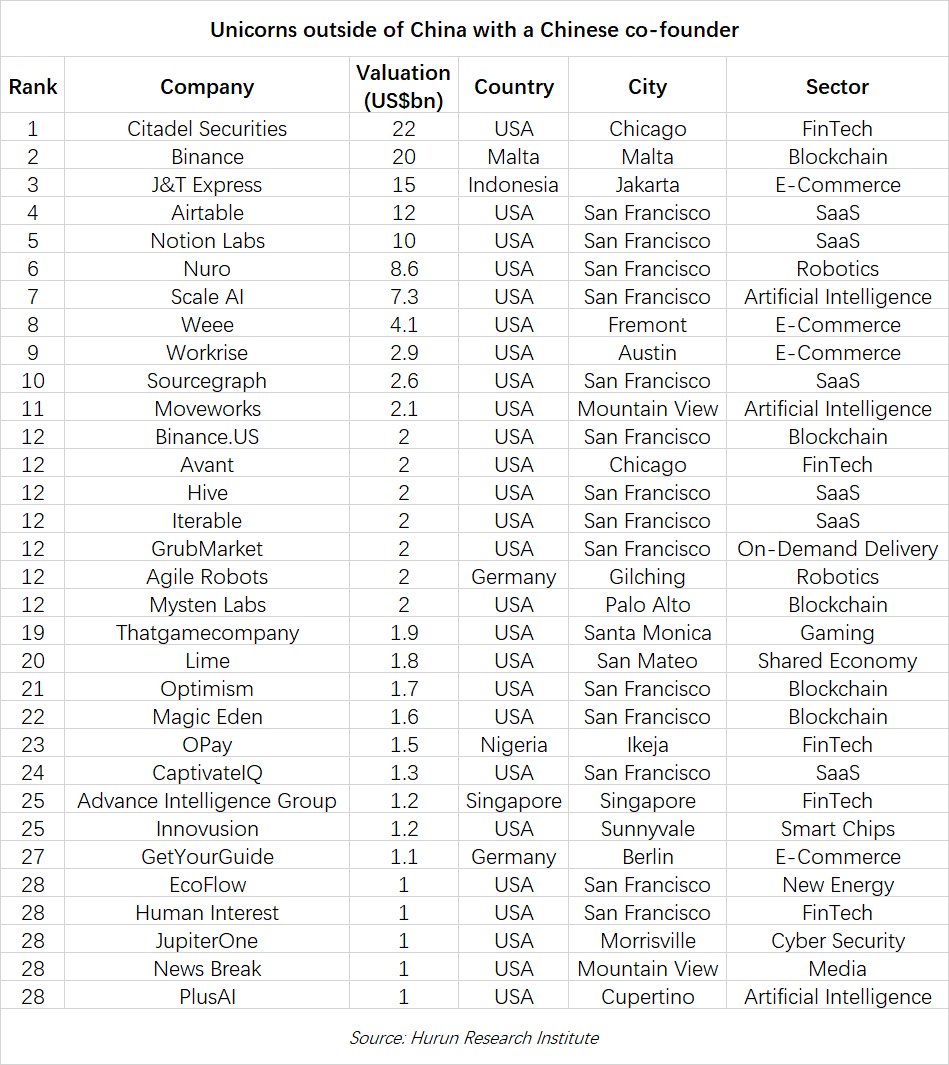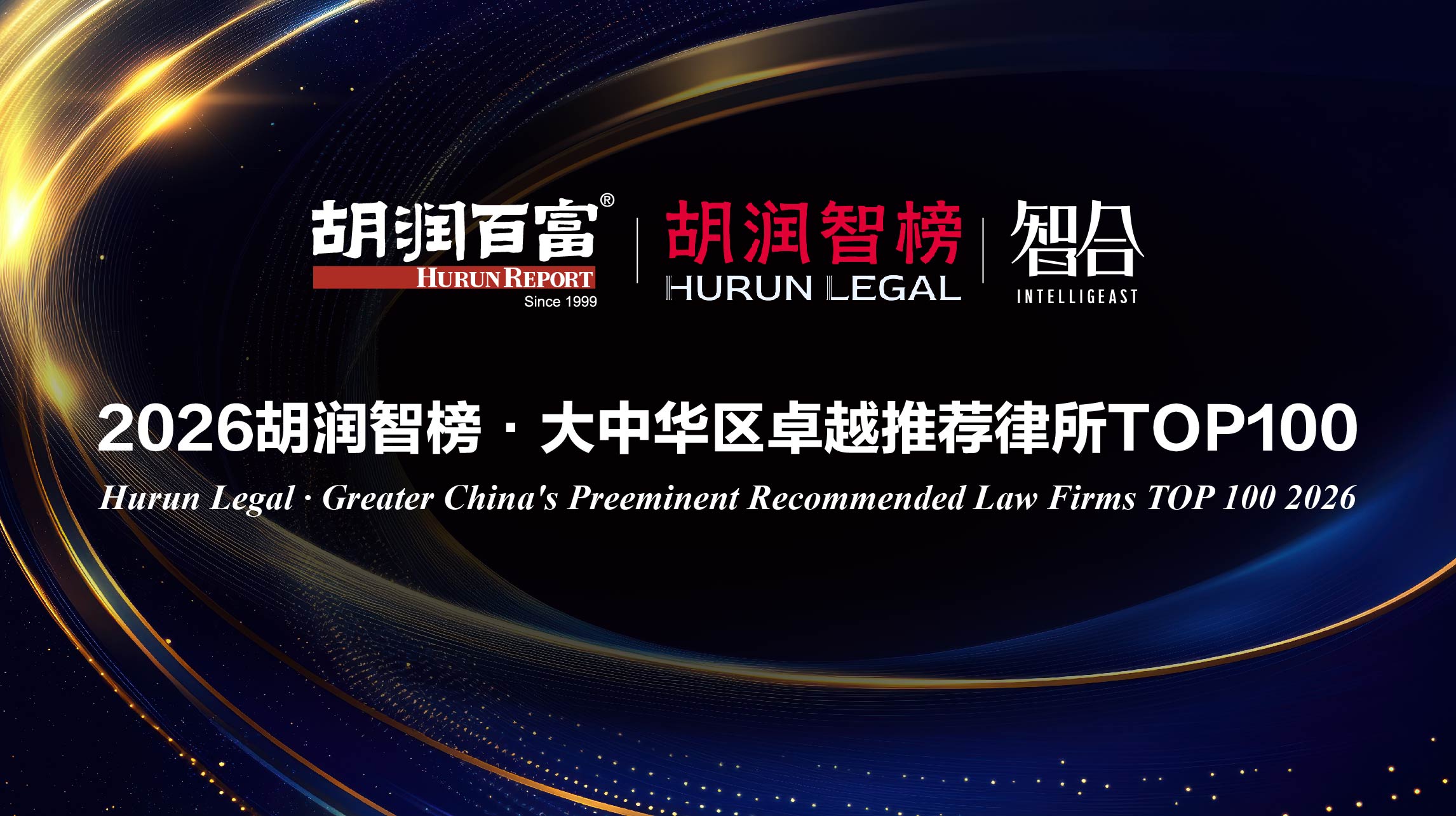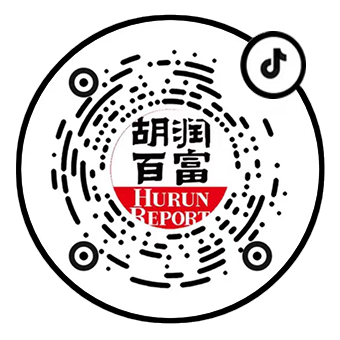Global Unicorn Index 2023
The Hurun Research Institute today released the Global Unicorn Index 2023, a ranking of the world’s start-ups founded in the 2000s, worth at least a billion dollars and not yet listed on a public exchange. The cut-off was 31 December 2022, with significant changes in valuation updated up to the date of release. Hurun Research has been tracking unicorns since 2017.
GLOBAL UNICORN INDEX 2023
IN SEARCH OF START-UPS FOUNDED AFTER 2000, WITH A VALUATION OF US$1BN AND NOT YET LISTED ON A PUBLIC EXCHANGE.
HURUN FINDS 1361 UNICORNS IN WORLD, UP 303 OR 29% IN LAST YEAR AND 867 OR 175% SINCE COVID BEGAN
USA LED WITH 666 UNICORNS, UP 179 IN ONE YEAR, 49% OF WORLD’S TOTAL. TRIPLE PRE-COVID DAYS OF 203.
CHINA SECOND WITH 316, UP 15 IN ONE YEAR AND 50% SINCE PRE-COVID DAYS OF 206. CHINA HAS MORE UNICORNS THAN NEXT 15 COUNTRIES COMBINED.
INDIA RETAINS 3RD PLACE WITH 68 UNICORNS, UP 14, AND 47 SINCE PRE-COVID
UK 4TH WITH 49 UNICORNS, UP 10. GERMANY 5TH WITH 36. ISRAEL UP ONE PLACE TO 6TH PLACE, ON PAR WITH FRANCE.
508 NEW UNICORNS IN PAST YEAR, LED BY USA WITH 250 AND CHINA WITH 107. 1323 NEW UNICORNS SINCE BEGINNING OF COVID, ONE NEW UNICORN A DAY, THE FASTEST UNICORN CREATION PERIOD IN HISTORY.
CHATGPT OWNER OPENAI ONE OF BEST PERFORMING UNICORNS IN WORLD IN PAST YEAR, UP SEVEN-FOLD OR US$17BN TO US$20BN, SHOOTING UP FROM 272TH PLACE TO 17TH IN WORLD.
GUANGZHOU-BASED SHEIN AND LA-BASED SPACEX ADDED US$45BN AND US$37BN IN PAST YEAR. OTHERS THAT GREW FASTEST INCLUDE NY-BASED WEB3 NFT MARKETPLACE OPENSEA (UP US$12BN), MASSACHUSETTS-BASED MEDICARE ADVANTAGE STARTUP DEVOTED HEALTH (UP US$11BN), SAN FRANCISCO-BASED HR SOFTWARE STARTUP RIPPLING (UP US$9.7BN), LA-BASED FOOD DELIVERY BUSINESS SETUP OPERATOR CLOUDKITCHENS (UP US$9.5BN), SAN FRANCISCO-BASED NOTE-TAKING APPLICATION NOTION LABS (UP US$8BN), SAN FRANCISCO-BASED HR MANAGEMENT PLATFORM DEEL (UP US$7.8BN) AND SHANGHAI-BASED FASHION BRAND TRADING PLATFORM DEWU (UP US$7.6BN).
BIGGEST DROPS IN VALUE INCLUDED BYTEDANCE DOWN US$150BN AS WELL AS US PAYMENTS PLATFORM STRIPE AND FINTECH KLARNA.
NO. OF COUNTRIES WITH AT LEAST ONE UNICORN DOUBLED SINCE COVID FROM 24 TO 48. FOR EXAMPLE, CANADA WHICH HAD NO UNICORNS PRE-COVID, ADDED 23 NEW UNICORNS SINCE BEGINNING OF COVID.
no Unicorns: Russia, SAUDI ARABIA, POLAND, VENEZUELA and sOUTH AFRICA ARE largest countries in world by GDP without a unicorn.
UNICORN CREATION ACCELERATED ACROSS CITIES, FROM 118 CITIES PRE-COVID TO 271 CITIES CURRENTLY.
SAN FRANCISCO RETAINED WORLD’S UNICORN CAPITAL WITH 181 UNICORNS. NEW YORK SECOND WITH 126, BEIJING THIRD WITH 79 AND SHANGHAI FOURTH WITH 66.
Guangzhou 22 unicorns, up 12, and almost triple pre-covid 8 unicorns. Greater bay area 63 unicorns, up 12, and double that of pre-covid 30 UNICORNS.
ENERGY, LIFE SCIENCES AND AEROSPACE HAVE SEEN BIGGEST DISRUPTIONS BY UNICORNS IN PAST YEAR.
FASTEST GROWN BY NUMBER OF UNICORNS: FINTECH FASTEST, ADDING 32 UNICORNS IN YEAR, FOLLOWED BY ENTERPRISE SERVICES 27, BLOCKCHAIN 23 AND LOGISTICS 23. OVERALL, FINTECH LED WITH 171 UNICORNS, FOLLOWED BY SAAS WITH 136 AND E-COMMERCE WITH 120. NEXT CAME AI WITH 105, HEALTHTECH 92, CYBER SECURITY 62 AND BLOCKCHAIN 53.
FINTECH OVERTOOK E-COMMERCE AS TOP UNICORN-PRODUCING INDUSTRY SINCE COVID.
3% OF LAST YEAR’S LIST OR 72 UNICORNS ‘PROMOTED’ AFTER IPO OR ACQUISITION, INCLUDING INDONESIA SUPERAPP GO-JEK AND CHINA-BASED MEDICAL SCANNING BUSINESS UNITED IMAGING AND CHINA-BASED FACIAL RECOGNITION SOFTWARE SENSETIME. 264 UNICORNS ‘PROMOTED’ SINCE COVID.
133 UNICORNS ‘DEMOTED’ FROM HURUN UNICORNS, WITH VALUATION DIPPING BELOW US$1BN. 55 FROM CHINA AND 50 FROM USA, LED BY FTX LAST YEAR WORTH US$32BN AND JUUL LABS WORTH US$12BN. 192 UNICORNS DEMOTED SINCE PRE-COVID, OF WHICH 70% FROM LAST YEAR.
TIKTOK OWNER BYTEDANCE RETAINS TITLE OF WORLD’S MOST VALUABLE UNICORN, WORTH US$200BN, DOWN US$150BN IN LAST YEAR.
ROCKET AND SATELLITE COMPANY SPACEX SECOND WITH US$137BN VALUATION, UP US$37BN.
DUBAI-BASED MESSENGING SERVICE TELEGRAM BROKE STRAIGHT INTO TOP 10 WITH a VALUE OF US$30BN.
SEQUOIA WORLD’S MOST SUCCESSFUL UNICORN INVESTOR FOR FIFTH YEAR, INVESTING INTO ONE IN SIX OF THE WORLD’S UNICORNS. TIGER GLOBAL AND SOFTBANK SECOND AND THIRD, ROUNDING OUT ‘BIG 3 UNICORN INVESTORS’.
AVERAGE UNICORN AGE OF 9 YEARS.
TOTAL VALUE OF UNICORNS IN WORLD US$4.3TN, UP 17% YEAR ON YEAR AND MORE THAN DOUBLE PRE-COVID.

(18 April 2023, Guangzhou, China & Mumbai, India) The Hurun Research Institute today released the Global Unicorn Index 2023, a ranking of the world’s start-ups founded in the 2000s, worth at least a billion dollars and not yet listed on a public exchange. The cut-off was 31 December 2022, with significant changes in valuation updated up to the date of release. Hurun Research has been tracking unicorns since 2017.
This report includes the Most Successful Unicorn Investors in the World 2023, a ranking of the 100 most successful unicorn investors, based on the number of unicorns they have invested in.
Hurun Research found 1,361 unicorns in the world, based in 48 countries and 271 cities. 508 new faces.133 were ‘demoted’ as their valuation no longer made US$1bn. 72 were ‘promoted’, of which 57 went IPO and 15 were acquired.
The world’s unicorns are disrupting financial services, business management solutions and healthcare. The total value of all known unicorns in the world is US$4.3tn, more than the GDP of Germany, double that of unicorns pre-Covid. 79% sell software and services, such as FinTech, SaaS, E-commerce and AI, whilst 21% have a physical product, led by New Energy, Biotech, F&B and Semiconductors.
Since the pandemic, the number of unicorns has surged from 494 pre-Covid to 1361 today, and the total value has risen from US$1.7tn to US$4.3tn. 1323 unicorns were ‘minted’, 264 were ‘promoted’, ie went IPO or were acquired, and 192 ‘demoted’, ie no longer making it to a valuation of US$1bn. The number of countries with at least one unicorn has doubled from 24 to 48, whilst the number of cities with at least one unicorn has grown from 118 to 271.
Unicorns were founded nine years ago in 2014 on average. Unicorn founders are 43 years-old on average, meaning that they founded their unicorn when they were 34. Unicorns have 2 founders on average. One third are serial entrepreneurs. 40% met at a previous job, whilst 1 in 8 met at university. Computer Science and Business Studies were the most common degrees pursued by the founders. One in five unicorns have at least one co-founder from outside the country of origin of the unicorn. The USA, especially Silicon Valley, attracted the most unicorn founders from abroad, followed by Europe. India led the way for emigrant unicorn founders, followed by China, Israel and Russia.
Hurun Report Chairman and Chief Researcher Rupert Hoogewerf said: “The three years since Covid began have been the most dynamic years in history when it comes to unicorns, with the world minting one unicorn every day for the past three years to take the total of known unicorns in the world to over 1360. Despite the slowdown in the economy, the world has minted over 500 new unicorns in the past year, just under ten a week.”
“The Global Unicorn Index 2023 is designed to give an insight into the economy of tomorrow, by listing out the world’s most successful startups. The sectors they are in and the countries and cities they are based in give an indication into which sectors are attracting the world’s top young talent and smartest capital, and which countries and cities have the best start-up ecosystems.”
“Last year was a year of two halves, with unicorns growing fast in the first half of the year, but then slowing down dramatically as the US raised interest rates together with global headwinds and uncertainties, with the result that investors all but stopped funding new projects. The collapse of Silicon Valley Bank in March this year further depressed valuations.”
“When researching unicorns, it is now possible to split the world into three: the US, China and ‘Rest of the World’. The US has 666, China 316 and Rest of the World 379. The main sectors of US-based unicorns were SaaS, FinTech and Health Tech, for China it was AI, Semiconductors and E-commerce, whilst for the Rest of the World, it was FinTech and E-commerce.”
“These three years since the pandemic began have been the most remarkable period for unicorns in the history of the world, with the world’s number of known unicorns all but tripling from 494 pre-Covid to 1361 today. In the period, 1323 unicorns were ‘minted’, 264 were ‘promoted’, ie went IPO or were acquired, and 192 ‘demoted’, ie no longer making it to a valuation of US$1bn.”
“Unicorns are dramatically changing the way we live and spend our money. OpenAI’s ChatGPT has had perhaps the largest impact across the world of any unicorn, shooting up in value to US$20bn and hitting the milestone of 100 million users within just over two months, the fastest-growing consumer software application ever. Others that have grown in value dramatically include the likes of Guangzhou-based fast fashion platform Shein, LA-based SpaceX, as well as Web3 NFT leader OpenSea, Medicare Advantage startup Devoted Health, HR software startup Rippling and food delivery business turnkey operator CloudKitchens.”
“Countries and cities have started to ‘wake up’ about unicorns, especially since the outbreak of Covid, realising the potential contribution of unicorns to the future of their economies. The more unicorns a place has, the better the start-up ecosystem. The number of countries with at least one unicorn has doubled from 24 to 48, whilst the number of cities has more than doubled from 118 to 271. Outside of the US and China, countries that have seen a boom in unicorns were led by India, and followed by the UK and Germany. Countries like Canada and the Netherlands ‘opened’ their unicorn accounts, adding 23 and 7 unicorns respectively over 3 years.”
“Which industries are unicorns doing? FinTech, SaaS, E-commerce and AI. The fastest-growing industries of the past year by number of unicorns are FinTech, Enterprise Services, Blockchain, Logistics, Cyber Security and AI.”
“Industries that have been most disrupted by unicorns in the past year are Energy, Life Sciences and Aerospace. Overall, unicorns are most disrupting Financial Services, Business Management Solutions, Healthcare and Retail.”
“The pipeline for the Hurun Global 500 is the Global Unicorn Index and the pipeline for the Global Unicorn Index is the Hurun Global Gazelle Index. From this, we can see how China and India have a higher percentage of Gazelles and Unicorns, which over the course of the next 5 years, ought to translate into a higher percentage of Hurun Global 500s. In the same way, France, Canada and Australia have a smaller percentage of start-ups, which suggests they will lose ground in the Hurun Global 500. The US has half of the world’s known unicorns and Global 500s, so will likely retain its dominance for the next five years.”
“The cut-off to make the Top 100 of the Hurun Global Unicorn Index has more than doubled from US$3bn pre-Covid to US$7.4bn, suggesting that unicorns are creating value faster than before, but also that the markets are flat with fewer IPOs than normal. In the past year in the US, for example, there have only been a dozen companies that IPO’d with a market cap of over a billion dollars.”
“I am delighted to release the Global Unicorn Index 2023 on the occasion of the Global Unicorn CEO Conference in Guangzhou, inviting the world’s unicorns, investors and advisers to discuss innovation and entrepreneurship, new technologies and business models.”
“I hope this list of the world’s unicorns can inspire individuals to drive value creation in new sectors and for countries and cities to recognise the importance of unicorns to their future economy. Yes, some will fail, and when they do it is normally to massive media attention, such as cryptocurrency exchange FTX or vaping app JUUL Labs, but on the whole unicorns are seen as inherently vital to the new economy.”
“A remarkable 71 unicorns were only founded since Covid began. Partly it shows the super-fast value creation generated by industries like Web3, AI and cyber security. Partly it shows the impact of serial entrepreneurs like Adam Neumann of WeWork fame, who last year founded a real estate start-up Flow with a valuation on start-up of a billion dollars. Then there’s Travis Kalanick of Uber fame who in 2017 founded CloudKitchens, which today is worth US$15bn. Partly it also shows how larger companies are spinning of business units which become unicorns in their own right, such as Zeekr, which was spun out of China-based car maker Geely and today has a valuation of US$13bn. Another is Web3 metaverse network MSquared, which raised money on a valuation of US$1bn, after being spun out of another unicorn London-based Improbable, worth US$3bn.”
“8 unicorns have already made it into the Hurun Global 500, becoming one of the 500 most valuable companies in the world. These were led by Beijing-based TikTok owner ByteDance, and include SpaceX, Ant Group, Shein, Stripe, WeBank, Databricks and Revolut.“
“The average age of unicorns in the Global Unicorn Index 2023 is nine years, suggesting that if you were to start a business today, you should aim to ‘go unicorn’ by 2032.”
“Founders from India, China and Russia are producing more offshore unicorns than any other country. India’s co-founded 70 unicorns outside of India compared with 68 in India, whilst Chinese co-founded 32 outside of China, compared with 316 in China. ”
“Serial entrepreneurs is a new trend that investors and governments are looking to, since these founders have the experience of running a business, building a team, attracting investors and thinking big. It is critical to a thriving startup ecosystem to encourage these people to live there. Best-known serial founders include the likes of Elon Musk, who has co-founded three unicorns on this year’s list: SpaceX, OpenAI and The Boring Company. Others include Travis Kalanick formerly of Uber and now CloudKitchens, Adam Neumann formerly of WeWork and now Flow and the likes of Jack Ma of Alibaba and later Ant Group, Liu Qiangdong of JD and later JDT, Li Shufu of Geely and now Zeekr.”
“Being a unicorn for too long is like the old English saying of ‘always a bridesmaid, never a bride’. The objective for most of these unicorns is to go IPO sooner or later.”
“The 27 members of the EU, despite contributing 8% to the world’s GDP, have only just under 100 or 7% of the world’s unicorns, slightly underperforming. Germany, France and the Netherlands led the way.”
“SE Asia, with its population of over 1 billion, underperforms when it comes to unicorns. Today there are only 23 known unicorns headquartered there, led by 9 from Singapore, 5 from Indonesia, 4 from Vietnam, 3 from the Philippines and one each from Thailand and Malaysia. Fintech and e-commerce are leading the way, followed by games and logistics.”
“Some regions like the Gulf States, are strong in their traditional sectors like energy and real estate but underperform when it comes to unicorns. There are four unicorns in the Gulf, all in the UAE.”
“The Global Unicorn Index is compiled using data from the world’s leading investors, the ‘entrepreneurs behind the entrepreneurs’, making this perhaps the most comprehensive attempt to capture all of the world’s unicorns into one list.”
“Hurun is committed to promoting entrepreneurship through its lists and research. Hurun’s ‘startup series’ has four main components. It begins with the Hurun U30s Entrepreneurs to Watch, a list of the top entrepreneurs under the age of 30. Next up are two ‘future unicorn’ lists, the pipeline for unicorns: Hurun Cheetahs, most likely to ‘go unicorn’ within 5 years and currently with a valuation of between US$200 million and US$500 million, and Hurun Gazelles, most likely to ‘go unicorn’ within 3 years and currently with a valuation of between US$500 million and US$1 billion. The Global Unicorn Index is the pinnacle of the world’s start-ups.”
According to the relevant person in charge of the Commerce Bureau of Guangzhou, Guangzhou strengthened innovation-driven development, registering a regional GDP of RMB 2.88 trillion as the only first-tier city in China with positive growth in consumption, foreign trade and foreign investment in the past year. Innovation is a vital engine for high-quality industrial development, and innovation capacities are mainly measured by scientific research strengths. Guangzhou has 97% of Guangdong Province's national key disciplines, 95% of doctoral students and seven “double first-class” universities. This year, Guangzhou has seen the creation of a fund of funds (FOF) worth RMB 50 billion dedicated to startups, sci-tech and innovation. Special funds, angel investment funds and seed investment funds have been established to give capital support and talent empowerment for unicorn enterprises' technology R&D and achievement commercialization.
As noted by the relevant person in charge of Huangpu District / Guangzhou Development District, the district has ranked first among China's development zones in terms of sci-tech innovation capabilities for four consecutive years with R&D investment accounting for 6.14% of the regional GDP, which is a world-leading level. In recent years, the district has attracted more than 20,000 sci-tech enterprises, more than 2,500 national high-tech enterprises, and over 500 gazelle enterprises. In 2023, seven businesses in the district have been included in the Global Unicorn Index, an increase of two from last year, ranking first among all districts in Guangzhou. This is mainly because the district has established a unique system for investment promotion, talent attraction and technology introduction to empower unicorn enterprises.
"The clustering of unicorn companies in Huangpu is attributable to the district's great emphasis on technological innovation. Huangpu is encouraging entrepreneurs to lead the way and take their businesses to a higher level. Such entrepreneurship is similar to that in Silicon Valley," said Rupert Hoogewerf.
Top 10 Unicorns in the World
Of this year’s Top 10, 5 are from China, 3 from the USA, and 1 each from the UK and UAE. The cut-off to make the Top 10 was US$27bn, down US$6bn compared with last year. This year’s Top 10 make up 17% of the total value of the world’s unicorns.
There were three new faces: Guangzhou-based Shein, Shenzhen-based WeBank and Dubai-based Telegram. They replaced Klarna, Canva and Instacart.
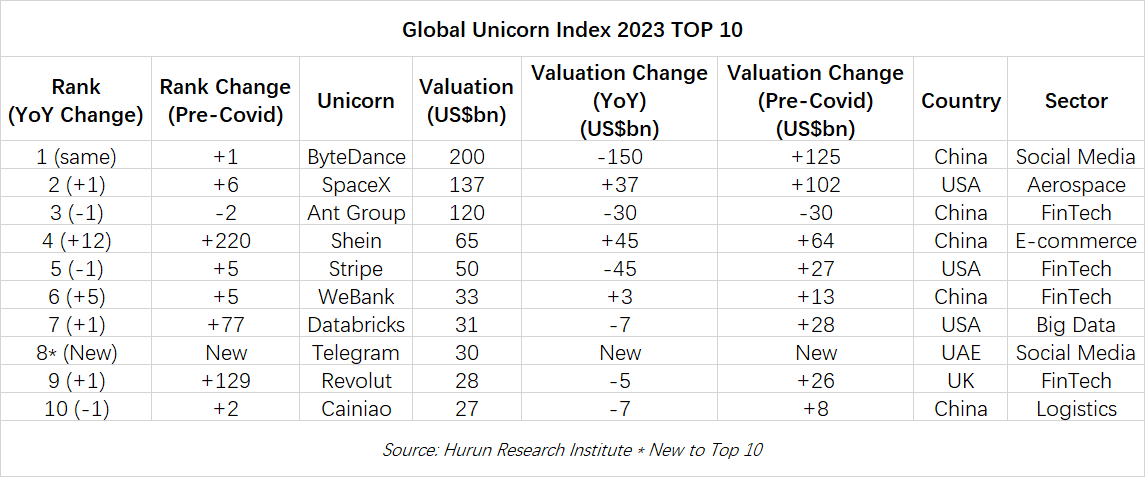
Founded in 2012, Beijing-based ByteDance is officially the world’s most valuable unicorn for the second year running with a value of US$200bn. ByteDance is reported to have generated revenues of US$80bn last year, predominantly in China. TikTok has become the most successful international Chinese brand, with a huge following overseas, although in the past year, control of the users’ personal data has been the subject of a US Congress inquiry.
LA-based SpaceX overtook Ant Group to second place with a valuation of US$137bn, up US$37bn in a year and a whopping US$102bn since Covid. SpaceX, the most valuable unicorn in the US, was founded by the world’s second richest person Elon Musk in 2002. Since then, SpaceX has raised US$9.8bn, with the latest one valuing the unicorn at US$137bn up from US$125bn last year. SpaceX’s, Starship, super heavy booster, which is designed to be a fully reusable transportation system to carry crew and cargo to Earth orbit, the Moon, Mars and beyond is scheduled to launch by end of April 2023.
Hangzhou-based Ant Group dropped down one place to third. Spun out of Alibaba in 2014, Ant was the most valuable unicorn in the world, until ByteDance overtook it in 2021 after its high-profile failed IPO. In January, founder Jack Ma relinquished control of the fintech giant, allowing for a restructuring that suggests it may IPO soon.
Guangzhou-based fast fashion brand Shein broke into the Top 10, up 12 places in the year and a massive 220 places since Covid, with a valuation of US$65bn, up US$45bn in a year and US$63.5bn since Covid, making it one of the most successful platforms since Covid.
San Francisco-based payment solutions platform Stripe, was down 1 place to 5th, after it raised money in March at a US$50bn valuation, down from last year’s US$95bn. Stripe has raised US$8.7bn in 20 funding rounds.
Tencent-backed digital bank WeBank was sixth, breaking into the Top 10 with a valuation of US$33bn. Founded in 2014, WeBank has since grown to have US$270bn of assets under management.
San Francisco-based Databricks, a data and AI company, was up one place to 7th with a valuation of US$33bn. Databricks last raised money from private investors in August 2021. Databricks is recently in the news for launching Dolly, an open source alternative to ChatGPT. Databricks is also one of the biggest winners since Covid, with its valuation up ten-fold from US$3bn pre-Covid.
Dubai-based messenger application Telegram broke into the Top 10. Since its 2013 inception, Telegram has raised a total of US$2.7bn in 2 rounds. Telegram became one of the most downloaded apps worldwide and now has just under 900 million monthly active users, of which 150 million are in India.
London-based digital bank Revolut has grown into the UK’s largest unicorn, was up one place to ninth in the world with a valuation of US$28bn. Revolut has raised a total of US$1.7bn over 19 rounds. Revolut has been hit in March when its auditors suggested that its reported revenue was materially misstated. Revolut has grown fourteen-fold since pre-Covid, when it had a valuation of only US$2bn.
Hangzhou-based Cainiao was down 1 place to 10th with a valuation of US$27bn. Alibaba-backed Cainiao was set up in 2013 and has grown to become the world’s most valuable logistics unicorn, with sales last year of US$24bn, up 27%.
Where are the World’s Unicorns based?
The world’s unicorns come from 48 countries, up from 42 last year, spread around 271 cities, up from 221.
USA led with 666 unicorns, up 179, followed by China with 316, up 15.
The USA added 250 ‘new faces’, while China added 107 and India 22. The USA had 23 ‘promotions’ from the Hurun index with 16 IPOs and 7 acquisitions. In China, 36 were promoted, 35 of which were IPOs.
India consolidated its Top 3 spot with 68 unicorns, led by online educator BYJU’S worth US$22bn, followed by on-demand delivery start-up Swiggy and fantasy sports platform travel-stay finder Dream11 (US$8bn each). A further 70 unicorns were started by Indian co-founders outside of India, taking the total to 138 unicorns founded by Indians around the world. Of the unicorns founded outside of India, significantly all were in the USA (64), led by the Bay Area, and 2 in the UK, and 1 each in Germany, Singapore, Indonesia and Mexico. For the full 70 index, see Appendix 2.
The UK was fourth with 49 unicorns, led by challenger bank Revolut with US$28bn. The UK has 6 new unicorns. Battery-maker Britishvolt dropped off the list after it was acquired in February 2023 by Recharge Industries through a distressed sale.
Germany retained fifth place with 36 unicorns. The most valuable unicorn in Germany was the Munich-based SaaS platform Celonis with a valuation of US$13bn.
By city. San Francisco retained the title of ‘World Unicorn Capital’ with 181 unicorns, up 30. New York is at second spot with 126 unicorns, up 41. With 79 unicorns Beijing was down 12 to third position, followed by Shanghai with 66. London with 42 unicorns was fifth, followed by Bengaluru and Shenzhen with 33 unicorns each.
To make the Hurun World’s Top 30 Start-up Cities required at least 9 unicorns. Austin, Suzhou, Denver, Chengdu and Miami broke into the Top 30, easing out Atlanta, Hong Kong, San Jose and Nanjing.
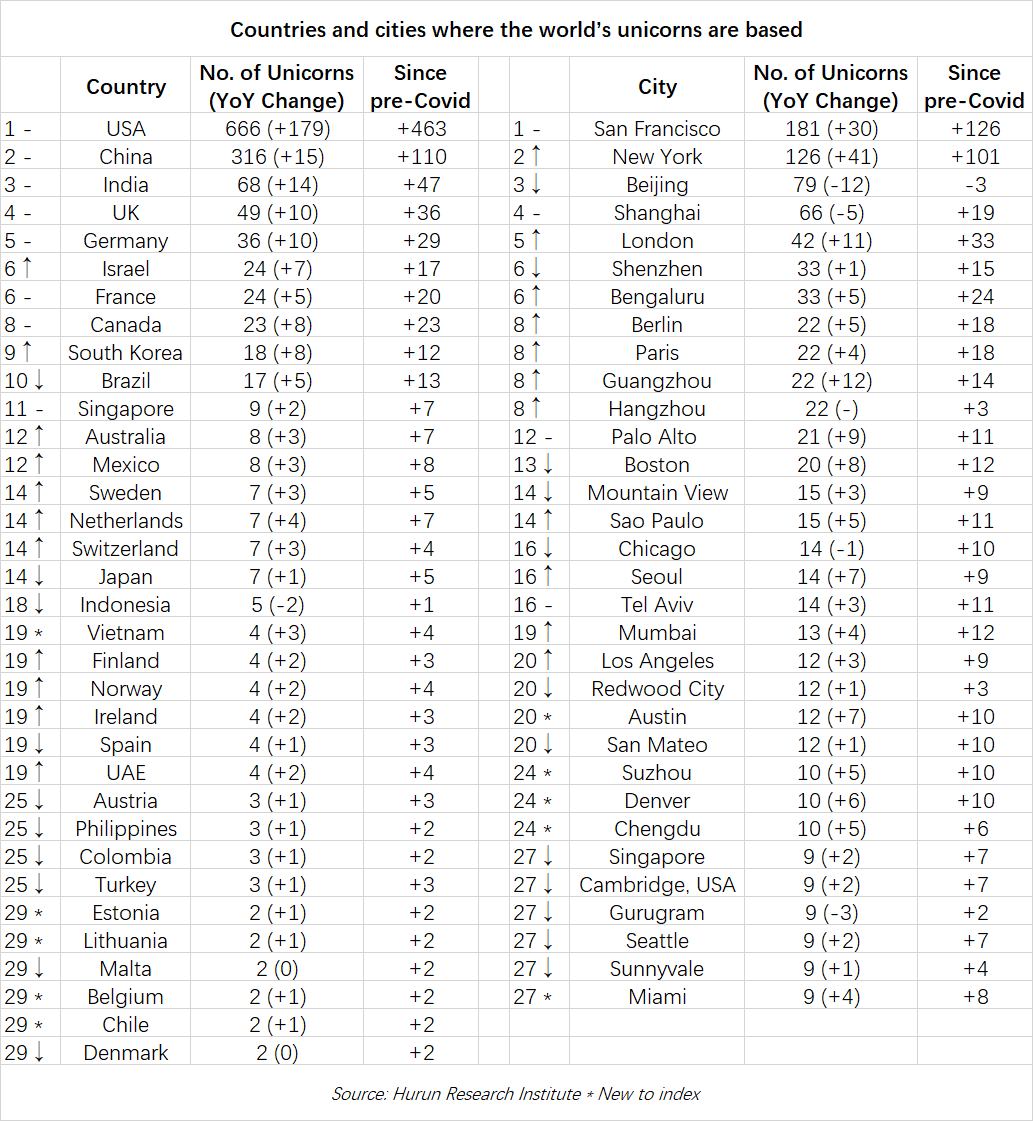
A comparison of the US, China and Rest of the World
The US has 666 or 49% of the 1361 world’s known unicorns, China 316 or 23% and the Rest of the World 379 or 28%.
By value, US-based unicorns had US$2tn or 47% of the US$4.3tn unicorns value, China US$1.3tn or 30% and the Rest of the World US$1tn or 23%.
By city, the US was led by San Francisco, China by Beijing and the Rest of the World by London. The ‘Big Two Cities’ for the US and China made up 46% of their unicorns, whilst the Rest of the World was more diversified with the ‘Big Two Cities’ only making up 20% of their 379 unicorns.
The fastest-growing cities in the US by number of unicorns were New York and San Francisco, in China it was Guangzhou, followed by Suzhou, Chengdu and Wuhan, whilst for the Rest of the World, it was London and Seoul.
China’s Top 10 cities had the highest concentration of unicorns, with 83%, followed by the US with 64% and the Rest of the World with 51%.
The main sectors of US-based unicorns were SaaS, FinTech and Health Tech, for China it was AI, Semiconductors and E-commerce, whilst for the Rest of the World, it was FinTech and E-commerce.
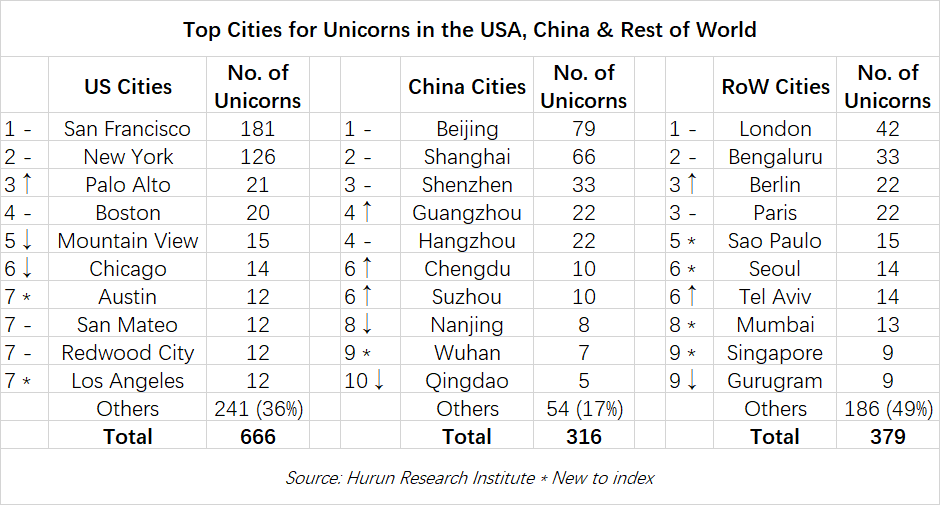
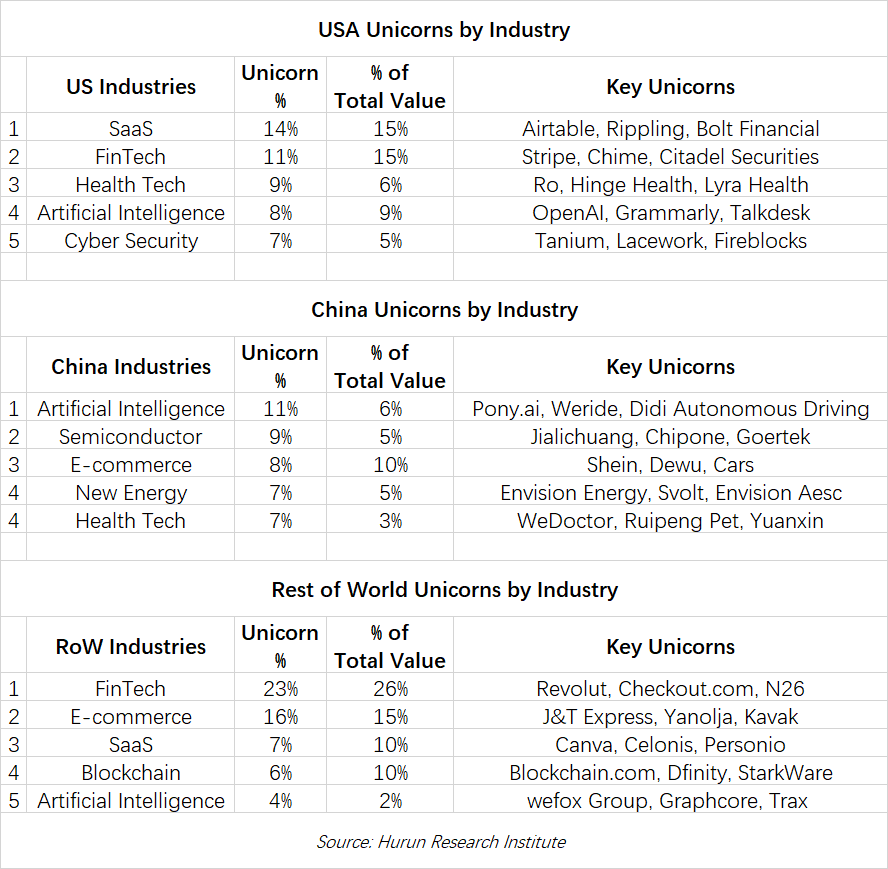
Can’t find a Unicorn here
Russia, Saudi Arabia, Poland, Venezuela and South Africa are the largest countries in the world by GDP without a unicorn. Some 150 countries in the world have no unicorn.
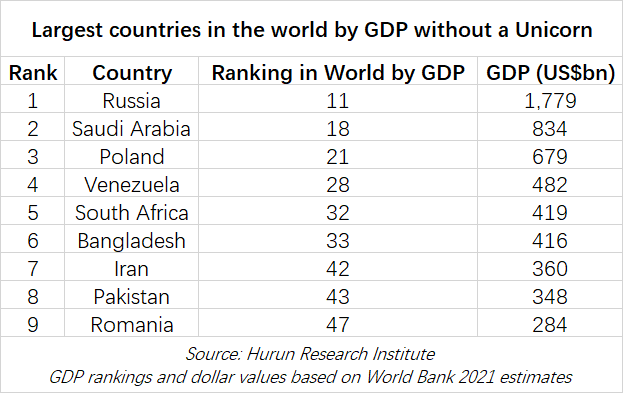
As a continent, North America has the most numbers of unicorns with 697, ahead of Asia with 463. In terms of total valuation, North America led with a value of US$2.1tn, followed by Asia with US$1.7tn and Europe with US$467bn.
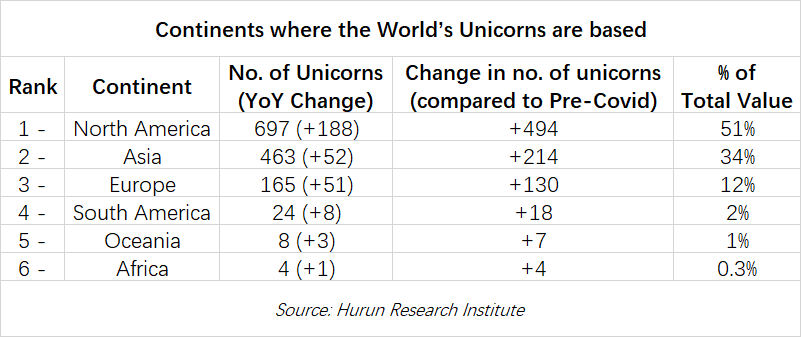
Who’s Up?
Hurun Research found 508 new unicorns from 16 countries from last year, led by the USA with 250, China with 107 and India with 22. The new unicorns were worth US$938bn, more than the GDP of Saudi Arabia.
The best-performing unicorns in the world in the last year were Shein, SpaceX and OpenAI, which added US$45bn, US$37bn and US$17bn respectively. Others that added US$10bn in the last year included OpenSea and Devoted Health.
The biggest new face was Dubai-based social media company Telegram, valued at US$30bn. Others of note included Guangzhou-based EV maker Aion, Vietnam-based e-retailer The CrownX, Shanghai-based smart wind power and energy storage start-up Envision Aesc and gaming platform Mihoyo.
Some like China-based smartphone manufacturers Oppo and Vivo, and Miami-based Citadel Securities, started by investor Ken Griffin, were already large companies, and have only this year been added into the Hurun Unicorn Index. Others like Didi became a unicorn again after taking itself private following a lacklustre US IPO. Seychelles-based cryptoexchange Kucoin bucked the trend of the rest of the industry, raising US$150mn in July last year at a valuation of US$10bn.
Since pre-Covid, the best-performing unicorns have been ByteDance, which added US$125bn, SpaceX up US$102bn and Shein US$63.5bn. Others include Databricks, Stripe, Revolut and Chime.
Others that have grown well since pre-Covid days, include Indonesia-based e-commerce platform J&T Express, US-based Lineage Logistics and China-based drinks brand Genki Forest.
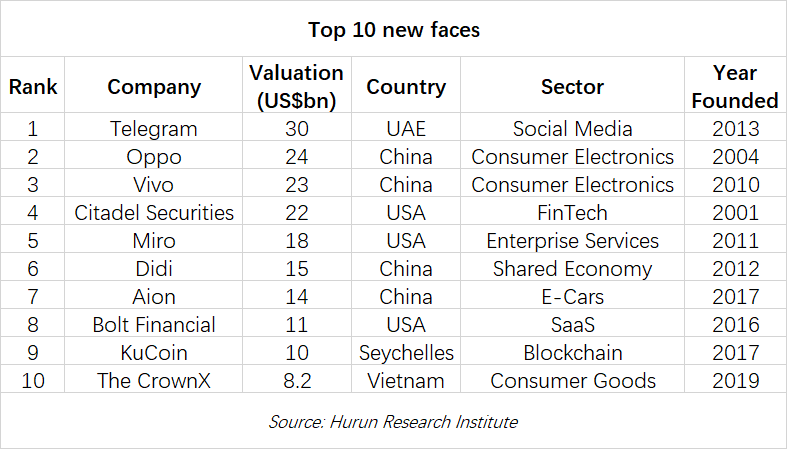

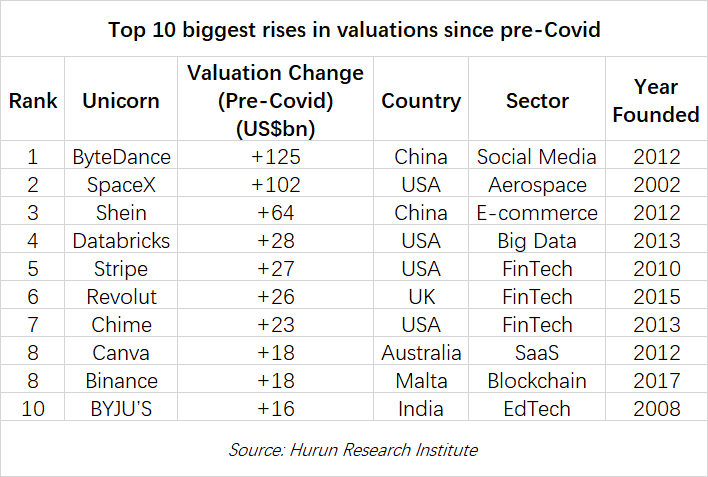
And, Who’s Down?
ByteDance led the way with a US$150bn drop in valuation, on the back of the bursting of the global tech bubble, followed by B2B payments system Stripe down US$45bn and Swedish unicorn superstar buy now, pay-later platform Klarna down US$42bn.
133 unicorns from the last year saw their valuation drop below US$1bn, of which 55 were from China and 50 from the USA.
The biggest casualty of the year was Bahamas-based cryptoexchange FTX, which had a valuation of US$32bn last year before declaring bankruptcy last November. Its spinoff FTX US, which was worth US$5bn last year, also failed. Others that dropped out included vaping brand JUUL Labs (US$12bn last year), as concerns grew of the harm caused by its marketing to young people. Self-driving startup Argo AI was worth US$7.3bn last year, but closed after major shareholders Ford and VW pulled the plug. Sports NFT platform Autograph, cofounded by NFL legend Tom Brady, dropped from its valuation of US$4bn last year to below US$1bn this year.
Others that dropped out since pre-Covid include London-based fintech platform Greensill, which pulled former prime minister David Cameron into a scandal as it went down, and India-based payments system PayTM.
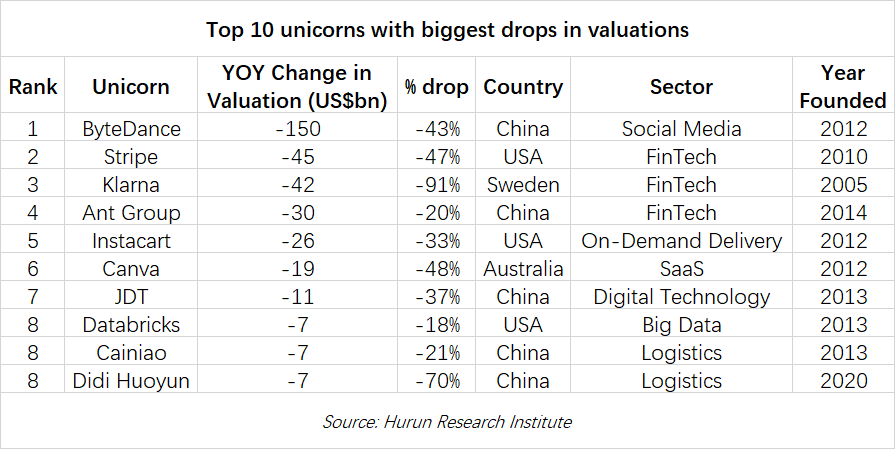
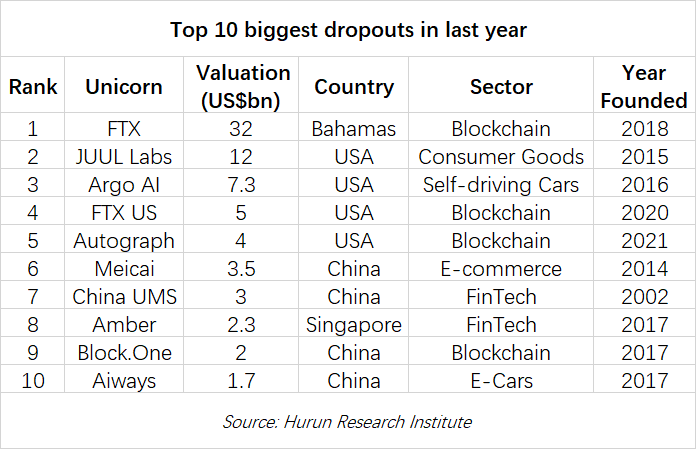
Unicorns gone IPO or acquired
72 unicorns from last year were ‘promoted’ out of the Hurun Unicorn Index, of which 57 went IPO and 15 were acquired.
The best-forming unicorn IPO were Samsara Networks, United Imaging, SenseTime and Cloudwalk, which are worth more after IPO than before. One unicorn saw its market cap drop below US$1bn, Sunnyvale-based self-driving car part maker Quanergy, which went bust less than a year after going public via a SPAC.
Vacation rental manager Vacasa’s share price dropped to below a billion after poorer than expected results, and UK-based AI-driven scientific innovator BenevolentAI also fell below US$1bn.
Since pre-Covid, the best-forming unicorn IPOs have been Snowflake Computing, Kuaishou and Airbnb, whilst e-shopping platform Wish used to have a valuation of US$11bn but last year all but went bankrupt.
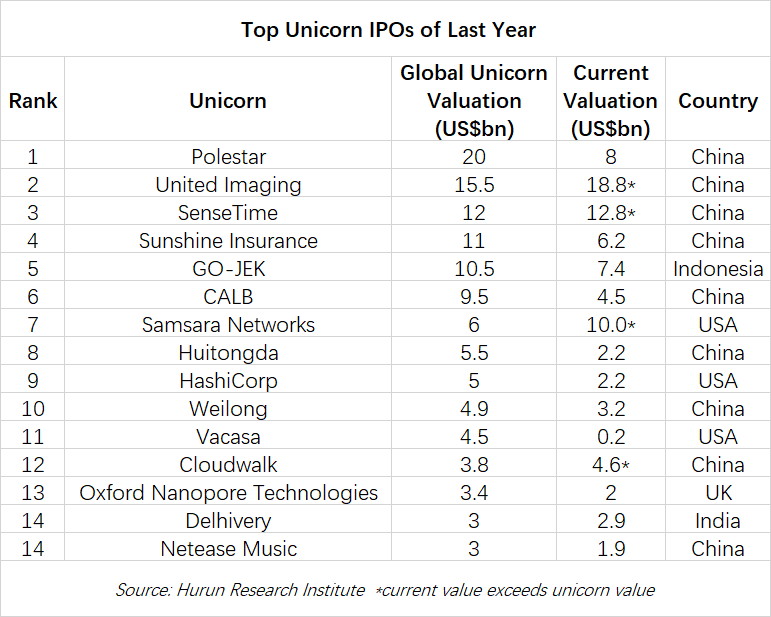
What industries do they come from?
FinTech, with 171 unicorns, is the industry with the most number of unicorns in the world, followed by SaaS (136), E-commerce (120) and AI (105).
The fastest-growing industries by number of unicorns are FinTech, Enterprise Services, Blockchain, Logistics, Cyber Security and AI.
Specifically, unicorns are doing Market Places most (64 unicorns), followed by Payments (37) and Banking (23). Fastest-growing specific sectors are HR Management, Network Security and Insurance.
Industries that have been most disrupted by unicorns in the past year are Energy, Life Sciences and Aerospace. Overall, unicorns are disrupting Financial Services, Business Management Solutions, Healthcare and Retail most.
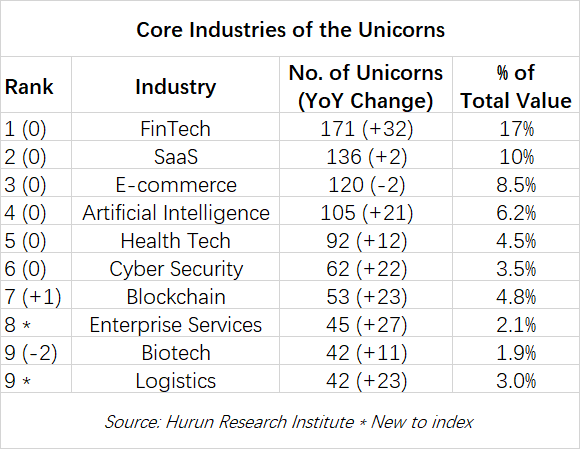
FinTech. There are 171 fintech unicorns in the world today, up 32 in the year, the most of any industry. 20% are payment technology-related unicorns. The most valuable FinTech unicorns are Ant Group (US$120bn), followed by payments platform Stripe (US$50bn) and WeBank (US$33bn). FinTech dominates with US$728bn or 17% of the total value of all unicorns.
SaaS. With 136 unicorns, SaaS is second. Top SaaS unicorns are Australia-based Canva (US$21bn), followed by Shanghai-based Xiaohongshu (US$14bn) and Munich-based Celonis (US$13bn). The total value of all SaaS unicorns is US$437bn.
E-commerce. There are 120 e-commerce unicorns with a total value of US$364bn. Apparel retailer Shein with US$65bn and Indonesia’s J&T Express with US$15bn lead the industry valuations, followed by San Francisco-based Faire with US$12bn. With 35 unicorns, the USA has the largest number of e-commerce unicorns, followed by China (24) and India (17).
Artificial Intelligence boasts 105 unicorns and is fourth, an increase of 21 in the year. With a US$20bn valuation, San Francisco-based OpenAI leads the industry followed by Grammarly (US$13bn) and Talkdesk at US$10bn.
HealthTech has 92 unicorns, up 12, making it the fifth largest sector with 6.8% of the unicorns. San Francisco has seen the most unicorn activity in HealthTech and is home to 18 unicorns. New York-based Ro and Hangzhou based WeDoctor are the most valuable HealthTech start-ups valued at US$7bn each, followed by Hinge Health (US$6.2bn).
Cyber Security has 62 unicorns, up 50% on last year, and is sixth. Led by Israel-based Wiz (US$10bn), followed by Emeryvile-based Tanium (US$9bn) and San Jose-based Lacework (US$8.3bn). These unicorns make up 4.6% of the global index and their combined valuation comes to US$149bn.
Blockchain comes next with 53 unicorns and is led by Malta-based Binance (US$20bn), followed by San Francisco-based Ripple (US$15bn), and New York-based OpenSea (US$13bn). These unicorns make up 3.9% of the global index and their combined valuation comes to US$204bn.
Enterprise Services is eighth, more than doubling its unicorns in the last year, to 45 unicorns and a total valuation of US$89bn. San Francisco-based visual collaboration platform Miro with US$18bn leads, followed by Helsinki-based RELEX Solutions with a valuation of US$5.7bn.
Biotech is ninth place with 42 unicorns with a total valuation of US$83bn, 3.1% of all unicorns. At the top is clinical-stage biotechnology company Biosplice Therapeutics (US$12bn), followed by Chicago-based Tempus (US$8.1bn).
Logistics comes ninth with 42 unicorns, more than double that of last year, and a total valuation of US$134bn. Hangzhou-based Cainiao with US$27bn valuation leads, followed by Novi-based Lineage Logistics with a valuation of US$18bn.
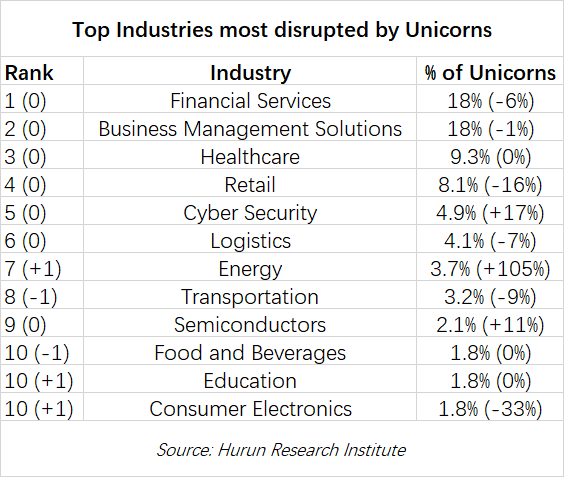
Which investors are the best at finding Unicorns?
Sequoia, with investments into 238 unicorns, retained its title of the most successful unicorn investor in the world, followed by Tiger Global and SoftBank.
The fastest-growing unicorn investor outside of the ‘Big Three’ was Y Combinator, which added 27.
For the full index of the Most Successful Unicorn Investors in the World 2023, see Appendix 1.
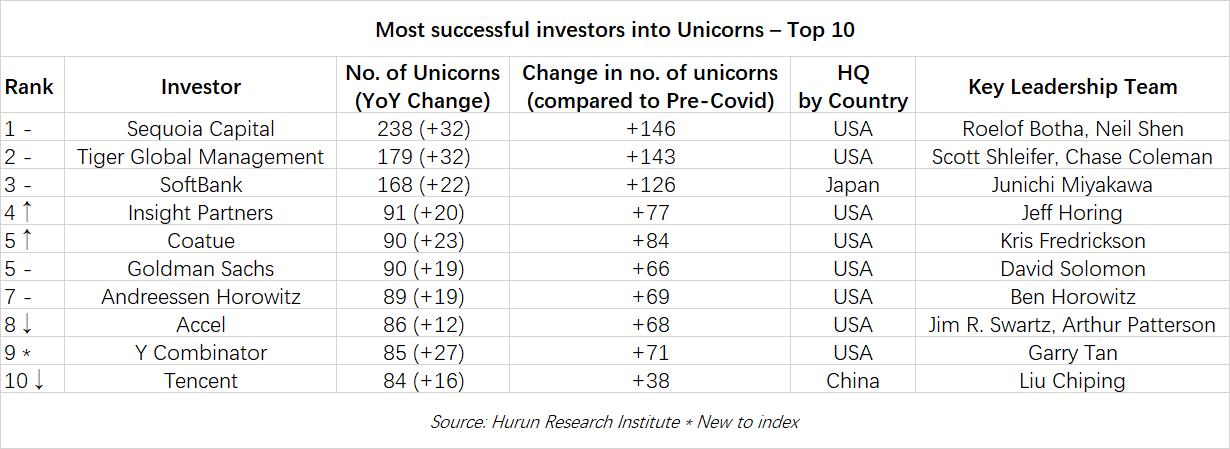
Which investors are the most successful at finding China Unicorns?
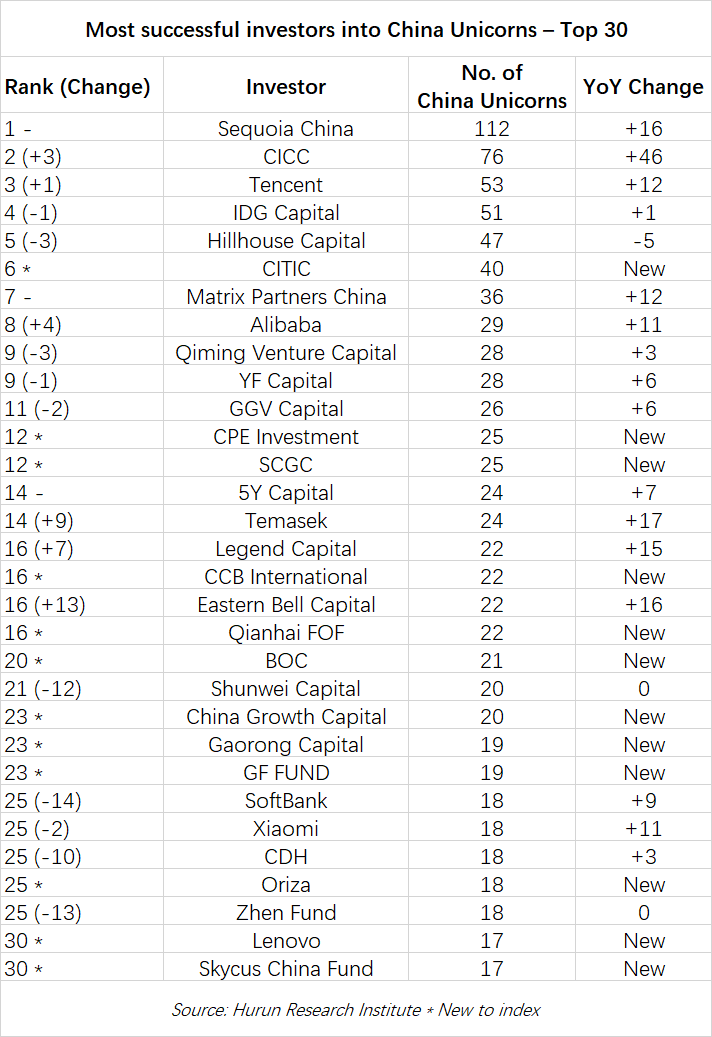
Comparison between Gazelles, Unicorns and Global 500
A Gazelle is a start-up founded in the 2000s, worth over US$500mn, not yet listed on a public exchange and most likely to ‘go unicorn’, i.e. hit a valuation of US$1bn, within three years. The Hurun Global 500 is a list of the 500 most valuable non state-controlled businesses in the world.
The pipeline for the Hurun Global 500 is the Global Unicorn Index and the pipeline for the Global Unicorn Index is the Hurun Global Gazelle Index. From this, we can see how China and India have a higher percentage of Gazelles and Unicorns, which over the course of 5 years, ought to translate into a higher percentage of Hurun Global 500s. In the same way, France, Canada and Australia have a smaller percentage of start-ups, which suggests they will lose ground in the Hurun Global 500. The US has half of the world’s known unicorns and Global 500s, so will likely retain its dominance for the next five years.
By city, San Francisco, Shanghai, Beijing, Shenzhen and Bengaluru have more start-ups and ought to have more Hurun Global 500s within five years. Tokyo and Paris have less startups, so are likely to see their percentage of the world’s most valuable companies go down. London seems to be stable.
By industry, healthcare and business management solutions ought to grow into Hurun Global 500 companies.
Companies selling software & services and directly to businesses, rather than consumers, are on the up.
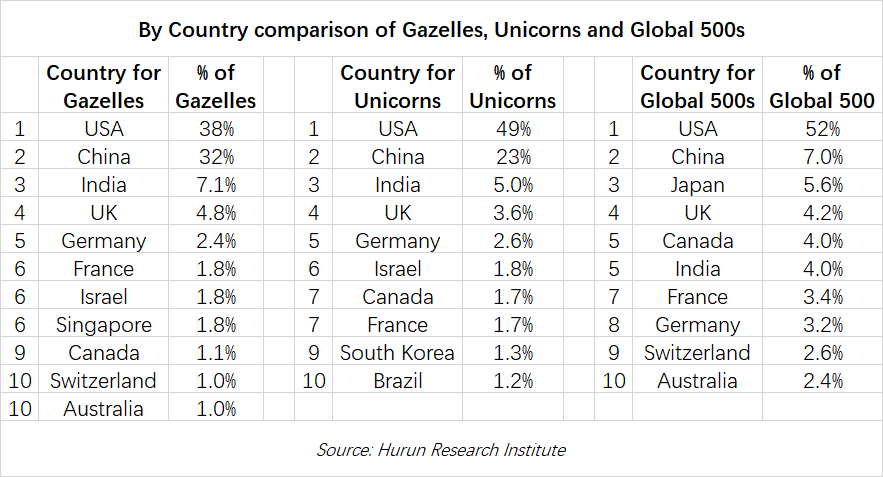
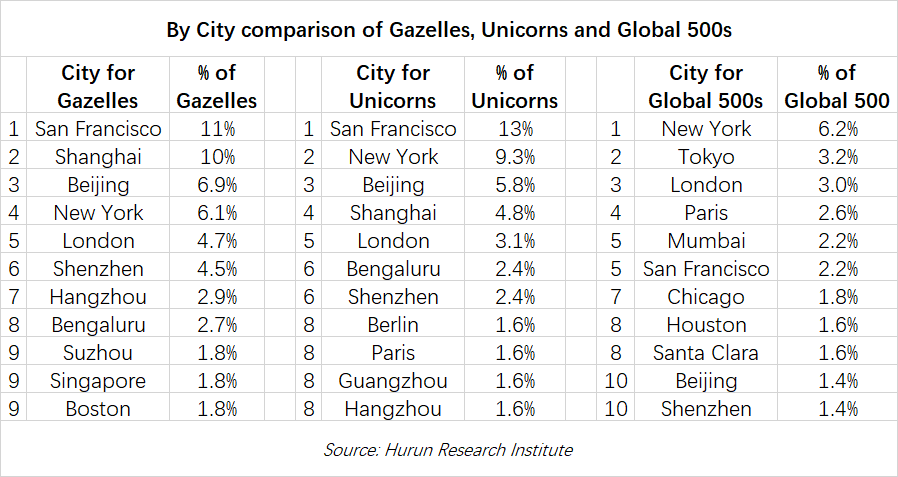


Key Statistics
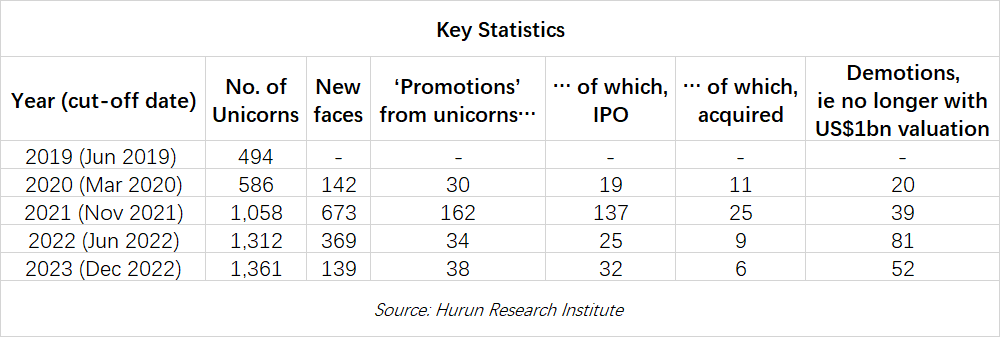
Methodology
The Global Unicorn Index is compiled by the Hurun Research Institute, and includes companies founded in the 2000s with a current valuation of US$1bn, not yet listed on a public exchange.
Cut-off for this year’s index was 31 December 2022, with significant valuation changes updated right up to the date of release.
For the one-year comparison, Hurun Research used the Global Unicorns Index 2021, released on 20 December 2021. For the pre-Covid comparison, Hurun Research used the Global Unicorns Index 2019, released on 21 October 2019.
Many of the world’s top investment houses provided details of their portfolio, which the Hurun research team cross-checked against specialized investment databases, industry experts, media sources, as well as unicorn co-founders.
Valuing unicorns can be tricky. The very nature of these super-fast-growing companies makes valuations hard to pin down, but to ensure consistency of the valuations, Hurun Research used the most recent valuation based on a sizeable round. Where it becomes harder is when a unicorn is underperforming or on its way down, since it is unlikely to have a new round of investment at a valuation lower than the previous round. In this case, Hurun Research used industry comparatives to ascertain a new lower valuation.
Countries and cities are ranked according to the unicorn head office.
Unicorns leave the Global Unicorn Index either by being ‘promoted’, ie by listing on a public exchange (IPO) or being acquired, or by being ‘demoted’, when their value drops below US$1bn.
Hurun Research has been tracking unicorns since 2017.
Disclaimer. All the data collection and the research has been carried out by Hurun Research. This report is meant for information purposes only. Reasonable care and caution have been taken in preparing this report. The information contained in this report has been obtained from sources that are considered reliable. By accessing and/or using any part of the report, the user accepts this disclaimer and exclusion of liability which operates to the benefit of Hurun. Hurun does not guarantee the accuracy, adequacy or completeness of any information contained in the report and neither shall it be responsible for any errors or omissions in or for the results obtained from the use of such information. No third party whose information is referenced in this report under the credit to it, assumes any liability towards the user with respect to its information. Hurun shall not be liable for any decisions made by the user based on this report (including those of investment or divestiture) and the user takes full responsibility for their decisions made based on this report. Hurun shall not be liable to any user of this report (and expressly disclaim liability) for any loss, damage of any nature, including but not limited to direct, indirect, punitive, special, exemplary, consequential losses, loss of profit, lost business and economic loss regardless of the cause or form of action and regardless of whether or not any such loss could have been foreseen.
About Guangzhou
Guangzhou, also called “Sui” for short, is the capital of Guangdong Province, a National Famous Historical and Cultural City, a national central city and a comprehensive gateway city, the core engine for the development of the Guangdong-Hong Kong-Macao Greater Bay Area, an international business and trade center, an integrated transportation hub, and a technological, educational and cultural center. It endeavors to become an international metropolis and an international consumption center city, and exercises jurisdiction over Nansha, a major platform for Guangdong-Hong Kong-Macao cooperation.
Millennium commercial capital
Hailed as the “millennial commercial capital” for its sustained flourishing maritime trade, Guangzhou has been a commercial city and water transportation hub in China since the Qin and Han dynasties. Guangzhou became the main port for the Maritime Silk Road from the 230s onwards, and became the largest port in China during the Tang and Song dynasties, and China’s only port for international trade during the Ming and Qing dynasties. The Qing government set up “imported goods firms” known as “Thirteen Hongs of Canton” in Guangzhou, which were tasked with operating import and export trade on behalf of the government. Guangzhou, a millennial city, thrives on business and is evolving into an international metropolis.
Size of economy
In 2022, Guangzhou registered a GDP of 2,883.9 billion yuan, a year-on-year increase of 1%. The added value of the primary industry was 31.831 billion yuan, up by 3.17%; the added value of the secondary industry was 790.929 billion yuan, up by 1.07%; the added value of the tertiary industry was 2,061.14 billion yuan, up by 0.97%.
Market size
According to the seventh population census, the total population of Guangzhou reached 18,676,600. As of the end of 2022, there were 3,155,500 market entities of various types in Guangzhou, a year-on-year increase of 3.88%.
Supporting industries
Guangzhou concentrates on seven industries: transportation equipment, petrochemical engineering, fine chemical, electronic information, iron and steel, pharmaceutical, and light textile. Guangzhou is putting in place a “3+5+X” system and a new spatial model of “123+N” for strategic emerging industries, and striving to build a new model of strategic emerging industry space featuring “one core, two belts, three cities and multiple nodes”.
Transportation facilities
In 2022, Guangzhou Baiyun International Airport ranked “top in China” for three consecutive years in terms of annual passenger throughput. Guangzhou Metro operates a total of 16 lines with a length of 621 kilometers. Guangdong is the sixth province to “bring high-speed rail access to every city”, with a total high-speed rail length of 5,278 kilometers. Expressways in Guangdong exceed 11,000 kilometers in length.
Business environment
In 2022, Guangzhou was ranked among the top in the Guangdong Province assessment report on business environment. In 2023, Guangzhou will carry out the edition 6.0 reform of business environment by launching a slew of reform measures that bring many gains to market entities throughout the process of implementation of projects, industry development and investment promotion.
China Import and Export Fair (Canton Fair)
Launched in 1957 and held every spring and autumn, Canton Fair is China’s oldest, highest-level, and largest comprehensive international trade event that features the largest varieties of commodities, the largest number of buyers, the largest number of participating countries and regions, and the best transaction results. It is hailed as “China’s first exhibition”. The 133rd Canton Fair has attracted over 34,000 overseas and domestic exhibitors and over 39,000 online exhibitors as well.
About Huangpu District / Guangzhou Development District
Located in the core area of the Pearl River Delta in Guangdong Province, Huangpu District / Guangzhou Development District is known as the "Pearl of the GBA" (Guangdong-Hong Kong-Macao Greater Bay Area), and is one of the first national economic and technological development districts. In 2022, it registered a regional GDP of more than RMB 400 billion and total industrial output of RMB 877.3 billion, with multiple key economic indicators such as realized FDI ranking top among China's economic development districts, making it Guangzhou's hub of real economy, main engine of sci-tech innovation, and key platform for reform and opening-up.
Huangpu District/Guangzhou Development District is building a strategic space featuring "Three Cities & One Island", namely Knowledge City, Science City, Maritime Silk Road City, and Bio Island. It has established five industrial clusters worth RMB 100 billion in the areas of automobile manufacturing, new display, green energy, new materials, cosmetics & healthcare, as well as three industrial clusters worth RMB 10 billion in the areas of biotech, high-end equipment and integrated circuit. It has ranked among the top three of China's top 100 industrial districts in terms of industrial competitiveness for five consecutive years.
During the 14th Five-Year Plan period, the District will concentrate on implementing its "Four Trillion Plans" to achieve an RMB 1 trillion-scale respectively in industrial output, state-owned capital, commodity sales, and fixed asset investment, and build two world-class emerging industry clusters of next-generation information technology and biotechnology. In addition, it will create four strategic emerging industry clusters of integrated circuits, new materials, green energy, and high-end equipment, while strengthening the two advanced manufacturing industry clusters of automobile and cosmetics. It will also bring in future-oriented industries such as quantum communications, brain science & brain-inspired technologies, optical communications and terahertz technology in a forward-looking way.
Huangpu District / Guangzhou Development District is among the most popular investment destinations for multinational companies in China, where Fortune Global 500 companies have invested in over 300 projects and more than 70 listed companies are based. The District became the only Chinese winner of the UN Investment Promotion Award in 2019, and has received the Award of National Investment Promotion Agencies and Projects for four consecutive years.
Huangpu District / Guangzhou Development District has outstanding innovation capacity. With the largest incubator cluster in South China, the District has ranked first among China's development zones in terms of sci-tech innovation capability for four consecutive years, as its R&D investment accounts for 6.14% of the district GDP, which is a world-leading level. Boasting strong scientific and technological strengths, the District has attracted more than 20,000 sci-tech enterprises, more than 2,500 national high-tech enterprises, and more than 500 gazelle enterprises in recent years. The number of listed companies based in the District accounts for 2/3 of Guangzhou's total.
Huangpu District / Guangzhou Development District has a large talent pool, encompassing teams led by Nobel Prize Winners and professional teams led by academicians Zhong Nanshan, Wang Xiaodong, Shi Yigong, etc. So far, over 100 academicians and 1,000 high-caliber talents have joined the District, making it a highly attractive destination for talents across China.
Huangpu District / Guangzhou Development District has a robust business environment. Being the only experimental zone for business environment reforms in Guangdong, the District has upgraded its business environment to "version 5.0", rolling out government approval services featuring "acceptance anytime, one visit to complete". Huangpu is the district most favorable to enterprises, as it has been the first in China to set up windows for receipt of policy supports. Policy supports can be gained through one visit within a limited time frame. It only takes 10.5 working days normally and half a day at the fastest speed. As the only pilot zone for IPR utilization and protection reforms in China, the District is home to over 200 IPR-related agencies such as Guangzhou IP Exchange, and Patent Examination Cooperation Guangdong Center of the Patent Office, CNIPA. Now it has a robust IPR protection system covering justice, mediation, arbitration, administrative law enforcement and speedy rights protection, and a resolution mechanism for diverse IPR disputes.
Huangpu District / Guangzhou Development District provides thoughtful full-process policy services, as it is the first area in China to issue four "10 Measures" for promoting industrial development and two "10 Measures" regarding talents and intellectual property rights, forming a robust policy system. In addition, the District has introduced a string of industrial policies with respect to hydrogen energy, green development, biopharma, etc.
Huangpu District / Guangzhou Development District has well-developed infrastructures. Healthcare: The District has high-quality tertiary Grade A hospitals, e.g. The Third Affiliated Hospital, Sun Yat-sen University; The East Division of the First Affiliated Hospital, Sun Yat-sen University; and Sun Yat-sen University Cancer Center. Many other tertiary Grade A hospitals are about to be opened, e.g. Huangpu Division of Guangzhou Twelfth People's Hospital, and Knowledge City Branch of Nanfang Hospital. Education: The District has international schools such as American International School of Guangzhou, Japanese School of Guangzhou, ISA International School of Guangzhou, Huangpu Shrewsbury Experimental School, Hwa Chong International School in Guangzhou Knowledge City, The Affiliated Foreign Language School of South China Normal University; domestic renowned middle and high schools such as Guangzhou No.2 Middle School, The High School Affiliated to Beijing Normal University, and The Affiliated High School of SCNU. Living: The District has Hilton Guangzhou Science City, DoubleTree by Hilton, Poly Holiday Inn, Knowledge City Mordin Hotel, and Narada Hotel Huangpu, as well as housing for talents such as Xiangxue International Apartment. Recreation: The District has commercial complexes such as Greenland Central Plaza, Wanda, Aoyuan, Minjie and Ruifeng Plaza; a wide range of cultural and sports facilities such as Guangzhou Baoneng Qoros Arena, International Tennis Center, and Badminton Center; as well as ecotourism sights like Changzhou Island, Jingxia Village, Maicun Village, and Liantang Village.
About Hurun Inc.
Promoting Entrepreneurship Through Lists and Research
Oxford, Shanghai, Mumbai, Sydney, Paris
Established in the UK in 1999, Hurun is a research, media and investments group, promoting entrepreneurship through its lists and research. Widely regarded as an opinion-leader in the world of business, Hurun generated 6 billion views on the Hurun brand last year, mainly in China and India.
Best-known today for the Hurun Rich Index series, telling the stories of the world’s successful entrepreneurs in China, India and the world, Hurun’s two other key series include the Hurun Start-up series and the Hurun 500 series, a ranking of the world’s most valuable companies.
The Hurun Start-up series begins with the Hurun U30s, an awards recognizing the most successful entrepreneurs under the age of thirty, and is today in seven countries. Next up are Hurun Cheetahs, Chinese and Indian start-ups with a valuation of between US$300mn to US$500mn, most likely to go unicorn with five years. Hurun Global Gazelles recognize start-ups with a valuation of US$500mn to US$1bn, most likely to go unicorn within three years. The culmination of the start-up series is the Hurun Global Unicorn Index.
Other lists include the Hurun Philanthropy Index, ranking the biggest philanthropists, the Hurun Art Index, ranking the world’s most successful artists alive today, etc…
Hurun provides research reports co-branded with some of the world’s leading financial institutions, real estate developers and regional governments.
Hurun hosted high-profile events in the last couple of years across China and India, as well as London, Paris, New York, LA, Sydney, Luxembourg, Istanbul, Dubai and Singapore.
For further information, see www.hurun.net.
For media inquiries, please contact:
Hurun Report
Porsha Pan
Tel: +86-21-50105808*601
Mobile: +86-139 1838 7446
Email: porsha.pan@hurun.net
Grace Liu
Tel: +86-21-50105808
Mobile: +86 136 7195 4611
Email: grace.liu@hurun.net
Global Unicorn Index 2023 TOP 100
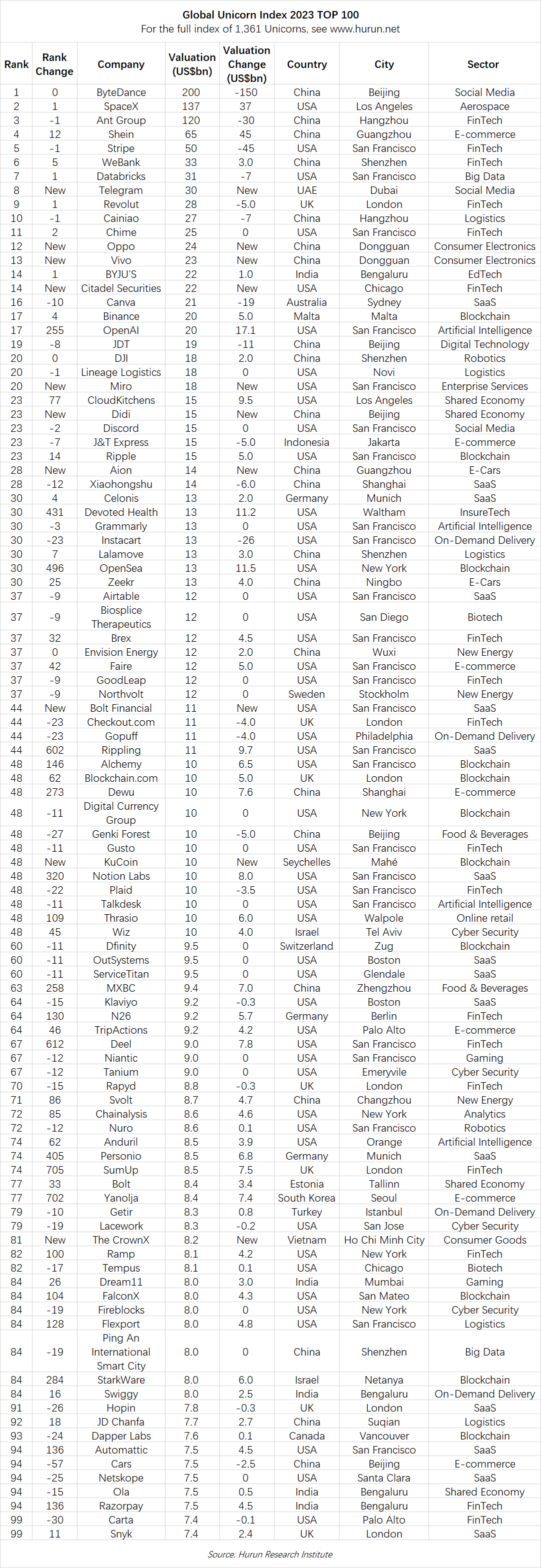
Appendix 1 – Most Successful Unicorn Investors in the World 2023

Appendix 2 – Unicorns founded by Indians outside of India

Appendix 3 – Unicorns founded by Chinese outside of China
